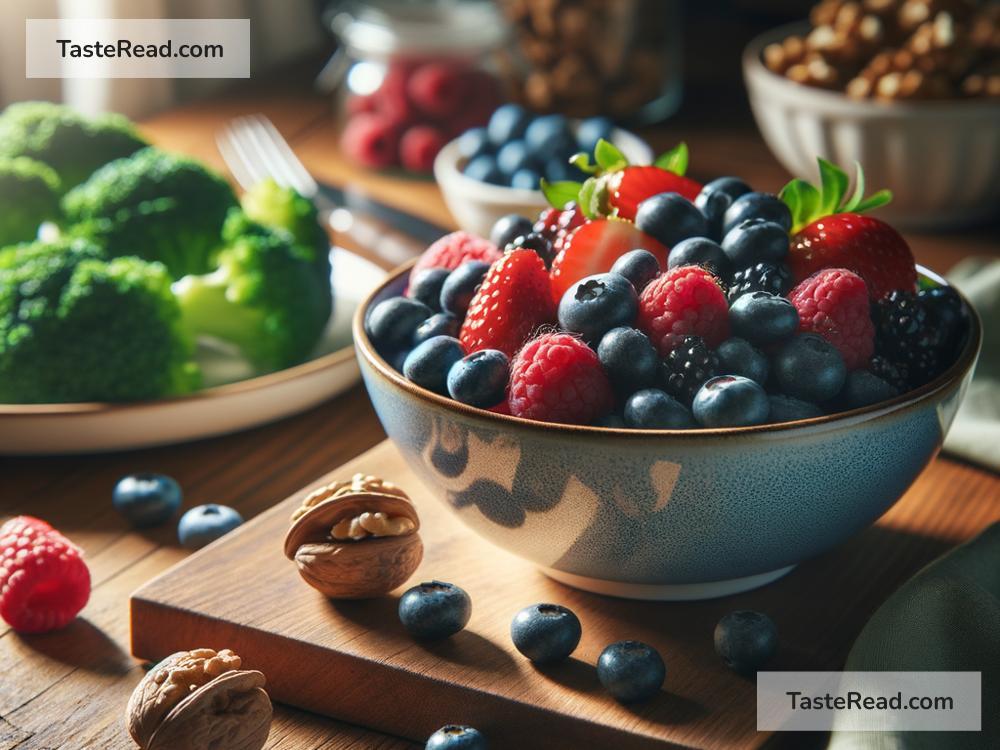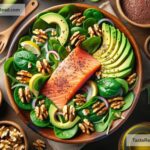Foods That Reduce Risk of DNA Damage
DNA (Deoxyribonucleic acid) is the blueprint of life, carrying the instructions for how our bodies grow, function, and repair. Every day, our DNA is exposed to various threats like environmental pollution, UV radiation, smoking, and even the natural processes that occur inside our cells as we age. Over time, this damage can build up and lead to health problems, including cancer, aging-related diseases, and weakened immunity.
But here’s the good news: You can protect your DNA by simply adjusting your diet! Certain foods contain powerful nutrients that help prevent DNA damage or even assist in repairing it. Want to learn the secret to keeping your cells strong and healthy? Let’s explore some DNA-protecting foods.
1. Berries – Tiny Fruits With Big Benefits
Blueberries, strawberries, raspberries, and blackberries aren’t just delicious—they’re packed with antioxidants. Antioxidants protect your DNA by fighting harmful molecules called free radicals. Free radicals are unstable molecules that can damage your cells, but antioxidants act like “bodyguards” for your DNA.
Polyphenols in berries have been shown to reduce oxidative stress, a condition where free radicals become overwhelming. Studies suggest eating berries regularly can help restore DNA health and reduce the risk of mutations that cause diseases like cancer.
How to enjoy: Add berries to oatmeal, smoothies, or yogurt, or just eat them as a healthy snack.
2. Cruciferous Vegetables – The Ultimate Cell Protectors
Vegetables like broccoli, cauliflower, kale, and Brussels sprouts contain compounds called glucosinolates. When you chew these veggies, glucosinolates turn into powerful substances that help your body fight off cancer-causing toxins and repair damaged DNA.
In particular, broccoli contains a compound called sulforaphane, which has been studied for its ability to activate enzymes that repair DNA damage and detoxify harmful chemicals in the body. Eating cruciferous vegetables regularly can significantly lower your risk of DNA-related diseases.
How to enjoy: Steam, sauté, or roast these veggies as a side dish. They also taste great in soups or salads.
3. Dark Chocolate – A Sweet Way To Protect Your DNA
Dark chocolate might feel like an indulgence, but it’s actually full of antioxidants called flavonoids. These flavonoids protect your cells from oxidative stress, reducing damage to your DNA. Dark chocolate with a higher cocoa percentage (70% or more) provides more benefits compared to milk chocolate, which has added sugars and fats.
Remember, moderation is key! While dark chocolate is filled with health benefits, eating too much can add extra calories and sugar to your diet.
How to enjoy: A small square of dark chocolate after dinner makes for a guilt-free treat.
4. Fatty Fish – Omega-3s For DNA Protection
Fatty fish like salmon, mackerel, sardines, and tuna are excellent sources of omega-3 fatty acids. Omega-3s help reduce inflammation in the body, which is a common cause of DNA damage. They also support proper cell division, which is crucial for maintaining healthy DNA.
Including fatty fish in your diet a few times a week can lower your risk of conditions associated with DNA damage, such as heart disease and certain types of cancer.
How to enjoy: Bake or grill fish for dinner. Pair it with vegetables for a balanced, nutrient-rich meal.
5. Green Tea – The DNA Repair Superdrink
Green tea is loaded with antioxidants called catechins, which protect cells from free radical damage and support DNA repair. Studies also suggest that the compounds in green tea can help prevent cancer and slow down the aging process by improving cell health.
Drinking green tea daily is a simple way to boost your antioxidant levels and keep your DNA functioning the way it should.
How to enjoy: Brew a cup of green tea in the morning or sip it throughout the day. Add a slice of lemon for extra flavor!
6. Nuts and Seeds – Tiny Powerhouses of Health
Almonds, walnuts, sunflower seeds, and flaxseeds are rich in vitamin E, zinc, and selenium—all of which play a role in protecting DNA from oxidative damage. Vitamin E acts as a shield for DNA, while selenium activates enzymes that repair DNA.
Including nuts and seeds in your diet is not only good for your DNA but also provides healthy fats, fiber, and protein.
How to enjoy: Sprinkle seeds on salads, blend them into smoothies, or snack on a handful of mixed nuts.
7. Leafy Greens – Nature’s DNA Enhancers
Spinach, kale, Swiss chard, and other leafy greens are bursting with essential nutrients like folate. Folate helps your body create new DNA and repair damaged strands. It’s especially important for pregnant women, as healthy DNA replication is crucial for fetal development.
Additionally, leafy greens contain antioxidants and vitamins (like C and K) that support overall cell health and reduce inflammation.
How to enjoy: Add leafy greens to salads, wraps, or smoothies. Cook them into soups, stir-fries, or pasta dishes.
8. Garlic – A Powerful Cancer Fighter
Garlic contains sulfur compounds that help the body eliminate toxins and protect DNA from damage. It’s also packed with antioxidants that keep your immune system strong, which is key to fighting off DNA-damaging agents.
Eating garlic regularly may lower your risk of certain types of cancer and promote overall health.
How to enjoy: Mince garlic and add it to sauces, marinades, or roasted vegetables.
In Conclusion
Your DNA plays a vital role in keeping your body functioning properly, and protecting it should be a priority. By including these foods in your diet, you can strengthen your cells, reduce the risk of DNA damage, and improve your overall health.
Remember, a balanced diet filled with colorful fruits, veggies, lean protein, and healthy fats is the best way to support your body on a cellular level. Pair these foods with a healthy lifestyle by exercising, staying hydrated, and reducing exposure to harmful habits like smoking. Your DNA—and your future self—will thank you!


